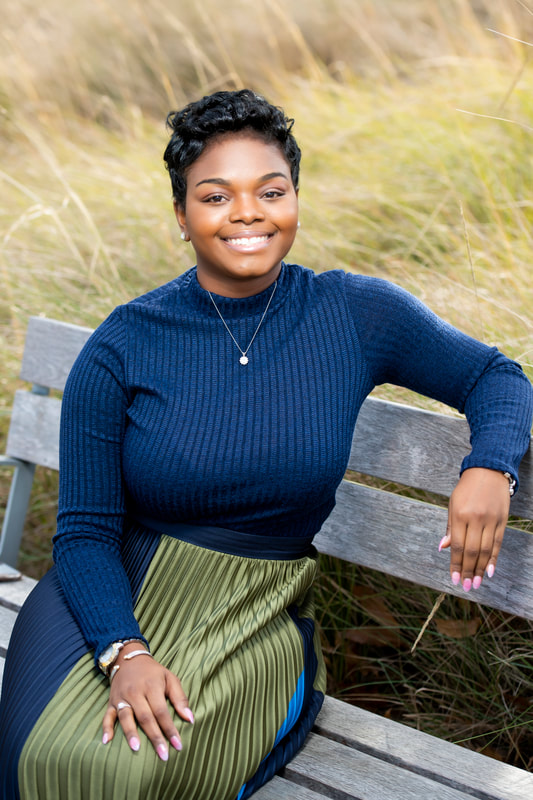|
By Megan Samuels, MSW, LMSW, Outreach Coordinator I had the pleasure to sit down with one of our fabulous recovery coaches, Javoni Cobb! One of the many things I love about Javoni is her passion and dedication for supporting people in recovery from an eating disorder. She provides eating disorder recovery coaching, with a specialty in working with children, teens and adults struggling with anorexia, bulimia, binge eating disorder, ARFID, body image issues, compulsive exercise, and anxiety. You can read more about her here! Megan: Tell me a little bit about yourself and what fueled your interest in helping people to recover from eating disorders? Javoni: I was born and raised in Florida and I grew up exploring all things dance, theatre, sports, and singing! I love to explore new things and try things that scare me, which was part of my introduction to working with people struggling with eating disorders. As a student in graduate school, my internship was at an eating disorder recovery center, which was very scary because I didn’t know much about the population. The clinical director took me under her wing and gave me as much information as possible and I became interested in the recovery journey that I saw client's on. I was then conducting individual sessions and meal support sessions for clients with eating disorders. I really enjoy working with this population because I learned so much about myself, my strength, and how I can pull strength from my clients in their darkest moments. I stuck with this population and grew to respect, learn, and then love working with eating disorders. Megan: What would you say are some common misconceptions when it comes to eating disorders? Javoni: The most common misconception is that eating disorders have a look. I really struggle with hearing that a lot of clients or prospective clients neglected treatment because they didn’t look like they had an eating disorder; or they had been turned away from treatment for the same reasons. Another one is that one diagnosis is more "unhealthy" or "worse" than the other. I believe that people have a hierarchy that comes from diet culture, which is the same standard that they give to eating disorders, which can be very dangerous when you hear the terms "sick enough". Another misconception is that eating disorders are only about food. It is so much more than food for many people. It's about trauma, it's about fear, it's about feeling and hearing that a person isn't good enough so often that they begin to believe it. Megan: How would you describe your approach as an eating disorder recovery coach? Javoni: My approach as an eating disorder recovery coach incorporates making sure every client has an individual plan based on their experiences. I focus on gradual change and use DBT and CBT skills to challenge unhelpful thoughts and behaviors. Due to my background in higher levels of care I can see the negative impact of expecting someone to change everything all at once, so I try my best to implement small changes over the course of treatment. I think a good pace helps with consistency which is so important in the recovery process. CBT and DBT are some of my best tools as they help clients to make sense out of their experience, and I also work to incorporate new coping skills for clients that are specific to their life and experience. Megan: Do you subscribe to a health at every size approach? Javoni: I subscribe to a health at every size approach because it is important to accept the diversity of body sizes but also teaching that a different body doesn’t mean an unhealthy body, an unloveable body, or an unworthy body. The health at every size (HAES) approach helps clients to learn that their body is enough and that they are fine where and how they are. Megan: What would you say are some of the biggest challenges and most rewarding aspects of your job? Javoni: The biggest challenge of my job is accepting when clients are not ready for the recovery journey - even when I want recovery so badly for them. I also understand that people recover when they are ready and have a mindset for change. The most rewarding aspect is seeing clients live the life that they once thought was impossible. For example, if a client goes to a restaurant and orders what they want without thinking about how it impacts their body, a reward of doing this work is them telling me how freeing that experience was for them. Megan: What is one piece of advice that you would give someone who is struggling in their recovery? Javoni: One piece of advice that I will give someone struggling in recovery is to identify one small thing that they are willing to change and focus on that for as long as they need to. I would also tell them to surround themself with people or an environment that is conducive to the recovery that they want. Megan: What are your biggest pet peeves about diet culture? Javoni: My biggest pet peeve about diet culture is that it is everywhere. This means that someone in recovery may have to navigate the world knowing they will often be exposed to so many triggering things. Another pet peeve is the lack of research behind so many aspects of diet culture. One thing I've learned about my work is that people want to know that it is evidence-based. Diet culture and dieting have so many disadvantages, but some people are so desperate for the results that theses disadvantages are overlooked. I hope that people will begin to question the information they receive around food and body image and learn to create an understanding that makes sense for their life and experiences, as every relationship with food and body image is individual. Megan: What would be a few of your tips for someone who is struggling with negative body image in recovery? Javoni: For the person struggling with body image, I would tell them that their body belongs to them and is not the property of our society. That being said, whatever you have been told about your body remember that it is yours, and it is okay to find new ways to like it, love it, and live with it. I would also tell them that body acceptance may feel far from where they are, but that doesn't mean that it is impossible to reach. I use skills and tools in session that I've found to be really helpful in terms of helping client to improve their relationship with their bodies. Want more? Check out this blog that explains what recovery coaching is and how it can benefit your recovery journey! The Eating Disorder Center is a premier outpatient eating disorder therapy center founded by Jennifer Rollin. We specialize in helping teens and adults struggling with anorexia, binge eating disorder, bulimia, OSFED, and body image issues. We provide eating disorder therapy in Rockville, MD, easily accessible to individuals in Potomac, North Potomac, Bethesda, Olney, Silver Spring, Germantown, and Washington D.C. We also provide eating disorder therapy in Arlington, Virginia and virtually throughout Virginia, as well as in D.C. Additionally, we offer eating disorder therapy virtually in New York (NYC), Florida, and California, serving those in cities including Palo Alto, San Francisco, Newport Beach, Los Angeles, Woodland Hills, San Jose, and Beverly Hills. We provide eating disorder recovery coaching via Zoom to people worldwide. Connect with us through our website at www.theeatingdisordercenter.com
By Megan Samuels, MSW, LMSW, Outreach Coordinator Orthorexia Nervosa is an eating disorder that is characterized by an obsession to eat “clean” or so called “healthy foods”. The diagnostic and statistical manual of mental disorders - fifth edition (DSM-5) does not formally recognize orthorexia nervosa as an eating disorder, however it has been on the rise for decades as new diets have evolved and that there has been more emphasis to eat “clean” or “healthy”. Not having a diagnostic criteria can make it difficult for people to be diagnosed and treated with orthorexia nervosa. Similar to anorexia nervosa, orthorexia nervosa includes restriction of food groups, rigidity around food, potential weight loss, potential health impacts, and body image disturbance. Note: Just being orthorexia nervosa is not in the DSM-5, does not make it any less dangerous of an eating disorder. Many people struggling with orthorexia nervosa suffer emotional, physical, and psychological consequences as a result of this disorder. If you think you are struggling with orthorexia nervosa, you deserve help and treatment! What does eating “clean” mean? Ultimately this is mainly a diet culture buzzword that has many definitions, however one definition of eating “clean” includes eating whole foods that are not processed or already prepared. This can also include eating whole grain pasta or bread and organic fruits and vegetables. The assumption is that other foods that are not “clean” are “dirty, “bad,” or “unhealthy” (which is totally false). Signs of Orthorexia Nervosa
How do you know if you struggle with orthorexia nervosa? If you experience any of the signs of orthorexia nervosa that are listed above, you may be struggling with orthorexia nervosa. The first step is to talk to an eating disorder therapist or dietitian who specializes in the diagnosis and treatment of eating disorders. There is often an overlap of orthorexia nervosa and obsessive compulsive disorder (OCD) because of the rigidity around food and the obsession with eating certain types of foods and having them be prepared in particular ways. So, how is this treated? Similar to other eating disorders, Cognitive Behavior Therapy (CBT), Dialectical Behavior Therapy (DBT), Acceptance Commitment Therapy (ACT), and Exposure Response Prevention (ERP) can help. Medical interventions and monitoring may also be needed. The therapists at The Eating Disorder Center have trainings in these therapeutic modalities to support the recovery journey for someone struggling with orthorexia nervosa. You can read more about Dialectical Behavior Therapy as a treatment modality for eating disorders here. *Disclaimer: The information is provided for educational and informational purposes only. It is not intended to be a substitute for your independent medical decision-making nor a recommendation or endorsement for any particular treatment plan, organization, provider, professional service, or product. The information may change without notice. You assume all responsibility and risk for any use of the information. Schedule a free 15 min consult for eating disorder therapy in MD, VA, NY, FL, or recovery coaching worldwide. Click here. The Eating Disorder Center is a premier outpatient eating disorder therapy center founded by Jennifer Rollin. We specialize in helping teens and adults struggling with anorexia, binge eating disorder, bulimia, OSFED, and body image issues. We provide eating disorder therapy in Rockville, MD, easily accessible to individuals in Potomac, North Potomac, Bethesda, Olney, Silver Spring, Germantown, and Washington D.C. We also provide eating disorder therapy in Arlington, Virginia and virtually throughout Virginia. Additionally, we offer eating disorder therapy virtually in New York (NYC), Florida, and California. We provide eating disorder recovery coaching via Zoom to people worldwide. Connect with us through our website at www.theeatingdisordercenter.com
|
The Eating Disorder CenterWe are a premier outpatient eating disorder therapy center in Rockville, Maryland. Archives
July 2024
Categories |


 RSS Feed
RSS Feed